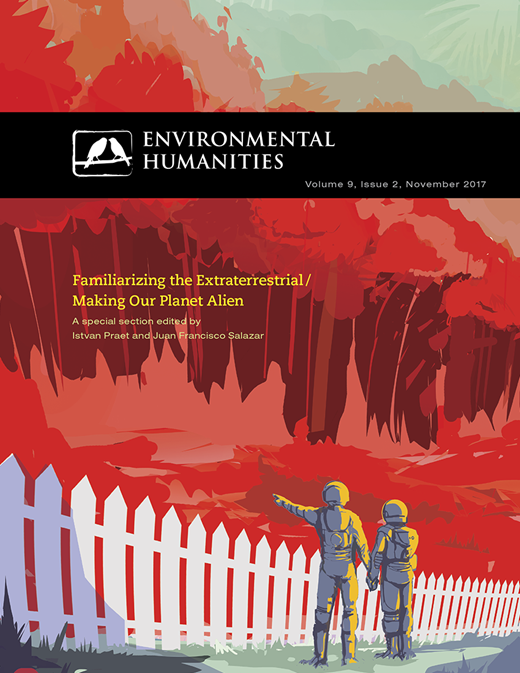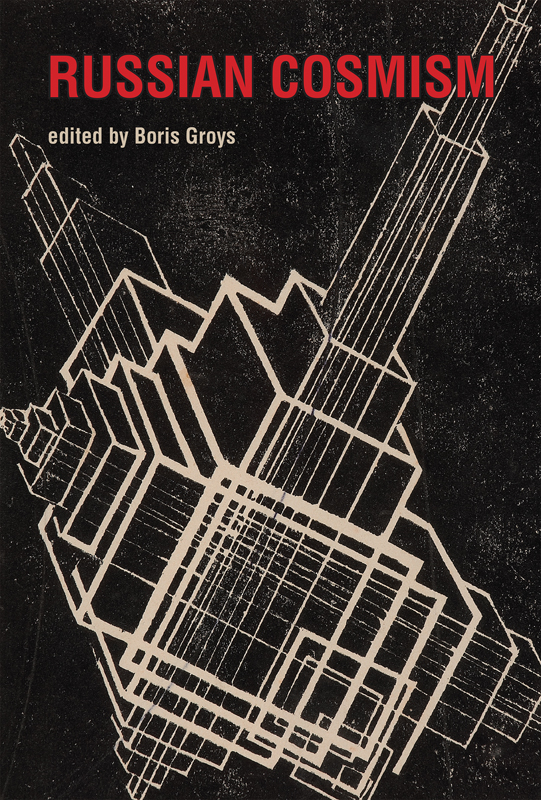Environmental Humanities, 9(2): Familiarizing the Extraterrestrial / Making Our Planet Alien (2017)
Filed under journal | Tags: · alien, astronomy, cosmos, earth, extraterrestrial, imagination, life, science, space

“A growing number of researchers in the social sciences and the environmental humanities have begun to focus on the wider universe and how it is apprehended by modern cosmology. Today the extraterrestrial has become part of the remit of anthropologists, philosophers, historians, geographers, scholars in science and technology studies, and artistic researchers, among others. And there is an emerging consensus that astronomers and other natural scientists—contrary to a common prejudice—are never simply depicting or describing the cosmos “just as it is.” Their research is always characterized by a specific aesthetic style and by a particular “cosmic imagination,” as some have called it. Scientific knowledge of the universe is based on skilled judgments rather than on direct, unmediated perception. It is science, but it is also an art. This special section focuses on two at first sight contradictory aspects of this cosmic imagination. On the one hand, there is a distinctive move toward viewing the extraterrestrial in familiar terms and comprehending it by means of conceptual frameworks that we, earthlings, are accustomed to. On the other hand, there is a tendency to understand our own planet in unfamiliar terms, especially in astrobiology, where so-called analog sites and “extreme environments” provide clues about alien planets.”
Special section edited by Istvan Praet and Juan Francisco Salazar
Publisher Duke University Press, November 2017
Creative Commons BY-NC-ND 3.0 License
ISSN 2201‐1919
pages 300-455
Boris Groys (ed.): Russian Cosmism (2018)
Filed under book | Tags: · art, avant-garde, biopolitics, cosmism, cosmos, philosophy, russia, technology

“Cosmism emerged in Russia before the October Revolution and developed through the 1920s and 1930s; like Marxism and the European avant-garde, two other movements that shared this intellectual moment, Russian Cosmism rejected the contemplative for the transformative, aiming to create not merely new art or philosophy but a new world. Cosmism went the furthest in its visions of transformation, calling for the end of death, the resuscitation of the dead, and free movement in cosmic space. This volume collects crucial texts, many available in English for the first time, by the radical biopolitical utopianists of Russian Cosmism.
Cosmism was developed by the Russian philosopher Nikolai Fedorov in the late nineteenth century; he believed that humans had an ethical obligation not only to care for the sick but to cure death using science and technology; outer space was the territory of both immortal life and infinite resources. After the revolution, a new generation pursued Fedorov’s vision. Cosmist ideas inspired visual artists, poets, filmmakers, theater directors, novelists (Tolstoy and Dostoevsky read Fedorov’s writings), architects, and composers, and influenced Soviet politics and technology. In the 1930s, Stalin quashed Cosmism, jailing or executing many members of the movement. Today, when the philosophical imagination has again become entangled with scientific and technological imagination, the works of the Russian Cosmists seem newly relevant.”
With texts by Alexander Bogdanov, Alexander Chizhevsky, Nikolai Fedorov, Boris Groys, Valerian Muravyev, Alexander Svyatogor, Konstantin Tsiolkovsky, Anton Vidokle, and Brian Kuan Wood.
Publisher e-flux, New York, and MIT Press, Cambridge, Massachusetts, 2018
ISBN 9780262037433, 0262037432
ix+249 pages
James Gardner: The Intelligent Universe. AI, ET, and the Emerging Mind of the Cosmos (2007)
Filed under book | Tags: · big bang, cosmos, emergence, genetic programming, quantum computing, technological singularity, technology

What is the ultimate destiny of our universe? That is the striking question addressed by James Gardner in The Intelligent Universe.
Traditionally, scientists (and Robert Frost) have offered two bleak answers to this profound issue: fire or ice.
The cosmos might end in fire—a cataclysmic Big Crunch in which galaxies, planets, and life forms are consumed in a raging inferno as the universe contracts in a kind of Big Bang in reverse.
Or the universe might end in ice—a ceaseless expansion of the fabric of space-time in which matter and energy are eternally diluted and cooled; stars wither and die , and the cosmos simply fades into quiet and endless oblivion.
In The Intelligent Universe, James Gardner envisions a third dramatic alternative—a final state of the cosmos in which a highly evolved form of group intelligence engineers a cosmic renewal, the birth of a new universe.
Gardner’s vision is that life and intelligence are at the very heart of the elegant machinery of the universe. It is a viewpoint that has won outspoken praise from an array of leading scientists, including Sir Martin Rees, Britain’s Astronomer Royal, and Templeton Prize winner Paul Davies.
The Intelligent Universe is both a look into the past and a road map for the future of the universe. It explores the mysteries of the universe and of consciousness, and provides a frank and fascinating look at where our minds are taking us.
Publisher Career Press, 2007
ISBN 1564149196, 9781564149190
Length 269 pages

